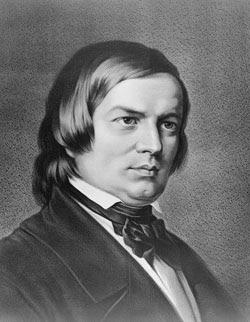You are here
An Epic Overture
As the son of a publisher and a well-read, studious fellow himself, the young Robert Schumann was interested in being a writer. When he realized his true passion was music, he instead became the only one of four brothers to quit the family publishing business, building a successful career as a composer, pianist, and music critic. Even so, he never forgot his literary roots, and showed a particular zeal for setting written works to music.
Schumann’s love of reading and frequent sleepless nights often led him to the pages of Lord Byron’s works. He set one of Byron’s poems to music as part of the song cycle Myrthen in 1840, and turned his attention back to the author in 1848 when he composed incidental music for a production of Manfred.
The dramatic poem is an example of Gothic fiction, utilizing supernatural elements akin to the English ghost stories so popular at the time. Consumed with guilt over an unnamed offense tied to the death of his lover, the protagonist wanders the Alps seeking forgetfulness and oblivion, and appeals to six spirits to aid him in his desire for the peace of death. It has been suggested that the forbidden relationship was an incestuous one, and that the poem is somewhat autobiographical; Byron wrote it shortly after accusations of an affair with his half-sister, among other sexual transgressions, led to the dissolution of his marriage.
The Overture reflects the brooding tone of the poem with unsettling music that builds in passion and urgency, and is punctuated toward the end by faint, ominous trumpet calls. From the dramatic opening chords to the dark, eerie mood of the introduction and the coda, the Manfred Overture is a masterfully written musical drama that keeps the audience on the edge of its seat, and remains one of the composer’s most popular works. It is known that Schumann felt particularly inspired by the challenge of composing this piece, and he himself commented that he had never before dedicated “such love and outlay of force to any composition as to that of Manfred.” The composer had a lifelong affinity with tragic literary figures, and his fate sadly bore this out; after battling mental illness for years, Schumann attempted suicide in 1854 and spent the remaining two years of his life institutionalized.

Robert Schumann